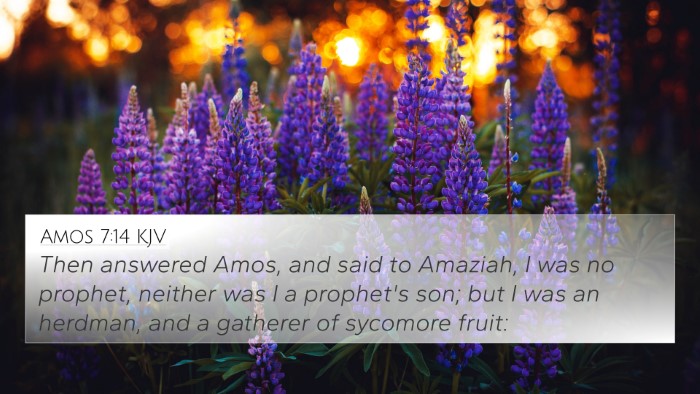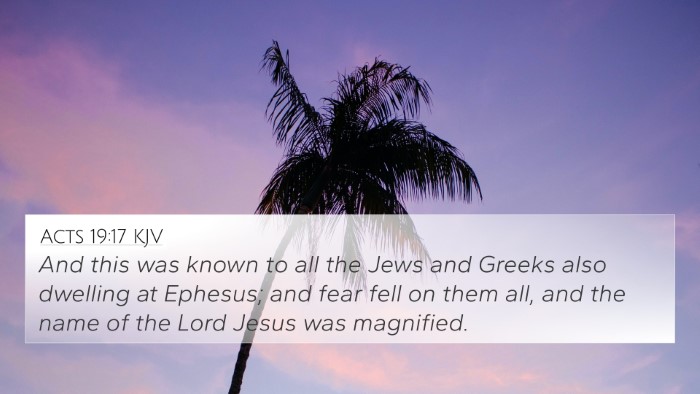Old Testament
Genesis Exodus Leviticus Numbers Deuteronomy Joshua Judges Ruth 1 Samuel 2 Samuel 1 Kings 2 Kings 1 Chronicles 2 Chronicles Ezra Nehemiah Esther Job Psalms Proverbs Ecclesiastes Song of Solomon Isaiah Jeremiah Lamentations Ezekiel Daniel Hosea Joel Amos Obadiah Jonah Micah Nahum Habakkuk Zephaniah Haggai Zechariah MalachiZechariah 13:5 Similar Verses
Zechariah 13:5 Cross References
But he shall say, I am no prophet, I am an husbandman; for man taught me to keep cattle from my youth.
Uncover the Rich Themes and Topics of This Bible Verse
Listed below are the Bible themes associated with Zechariah 13:5. We invite you to explore each theme to gain deeper insights into the Scriptures.
Zechariah 13:5 Cross Reference Verses
This section features a detailed cross-reference designed to enrich your understanding of the Scriptures. Below, you will find carefully selected verses that echo the themes and teachings related to Zechariah 13:5 KJV. Click on any image to explore detailed analyses of related Bible verses and uncover deeper theological insights.

Amos 7:14 (KJV) »
Then answered Amos, and said to Amaziah, I was no prophet, neither was I a prophet's son; but I was an herdman, and a gatherer of sycomore fruit:

Acts 19:17 (KJV) »
And this was known to all the Jews and Greeks also dwelling at Ephesus; and fear fell on them all, and the name of the Lord Jesus was magnified.
Zechariah 13:5 Verse Analysis and Similar Verses
Understanding Zechariah 13:5
Zechariah 13:5 states: "But he shall say, I am no prophet, I am an husbandman; for man taught me to keep cattle from my youth."
This verse provides profound insight into the prophecies surrounding the coming Messiah and the difficult times faced by the people of Israel. The context in which this verse appears relates to the theme of purification and restoration after a period of trial and rejection. Below, we summarize insights from key public domain commentaries to aid in understanding.
Summary of Interpretations
-
Matthew Henry:
Matthew Henry emphasizes that this statement reflects humility. The person speaking claims not to possess the status of a prophet but instead identifies with a humble profession. This admission shows a recognition of false prophets and the dangers of pride within prophetic office. The husbandman, or farmer, symbolizes a grounded reality, focusing on daily labor rather than lofty spiritual claims.
-
Albert Barnes:
Albert Barnes discusses how this verse illustrates a transition in the identity of God's messengers. The speaker’s refusal to be labeled a prophet implies a significant change following a time of religious corruption. The identity of a "husbandman" serves to emphasize the return to simplicity and authenticity in spirituality among the people, as well as a disavowal of the false and corrupt practices that had arisen.
-
Adam Clarke:
Adam Clarke interprets the passage as a representation of those who genuinely serve God amidst prevailing disillusionment. The mention of being taught to keep cattle suggests a learned and responsible role, possibly reflecting the idea that the true followers of God are being trained in humility and service, distancing themselves from the pretenses of prophecy.
Key Themes
-
Humility and Authenticity:
Central to the verse is the theme of humility. The speaker's admission of not being a prophet suggests an emphasis on genuine service to God rather than self-promotion.
-
Rejection of False Prophecy:
This verse captures the struggle against false prophets, revealing the need for true spirituality among God’s people. It signifies a desire for authenticity in worship and leadership.
-
Transformation and Restoration:
The verse hints at a profound transformation within the community as they seek to return to true devotion and service, which aligns with broader prophetic themes of restoration found in Zechariah.
Bible Verse Cross-References
To better grasp the meaning of Zechariah 13:5, consider these related verses:
- Jeremiah 14:14: Reference to false prophets claiming to speak in God’s name.
- Ezekiel 13:3: God warns about the lies of false prophets.
- Matthew 7:15: Jesus speaks about false prophets who come in sheep's clothing.
- 1 John 4:1: A call to test the spirits to discern true prophecy.
- Matthew 11:29: Jesus illustrates humility and gentleness, resonating with being a servant.
- Luke 10:2: Jesus mentions the laborers (workers), similar to the husbandman concept.
- Zechariah 11:15: Discusses false shepherds and the consequences of their actions.
Connections Between Bible Verses
Understanding Zechariah 13:5 requires examining its connections within broader scripture contexts. This passage illustrates how prophetic identities were reshaped during moments of crisis, which resonates with the teachings of Jesus and parallels found in the writings of the apostles.
- The humility expressed in Zechariah can be seen in Philippians 2:3-4, where believers are encouraged to value others above themselves.
- The concept of servitude in Luke 17:10, where servants do their duty without expecting recognition, complements the desire for humility displayed in Zechariah 13:5.
- James 4:10 emphasizes that those who humble themselves before God will be exalted, reinforcing themes of humility and authentic worship.
Thematic Bible Verse Connections
Many lessons gleaned from this passage encourage a deeper engagement with scriptural cross-referencing. By using tools such as a Bible concordance or a Bible cross-reference guide, one can trace themes such as humility, the dangers of false prophecy, and the anticipation of restoration throughout both the Old and New Testaments.
Key Takeaways:
- Seek to understand biblical passages in context, recognizing the relevance of humility and authenticity in ones` walk with God.
- Use cross-referencing tools to connect scriptures and enrich understanding of biblical themes and teachings.
- Engage with scripture actively, considering both texts and the overarching messages they convey about the nature of God and His relationship with humanity.


